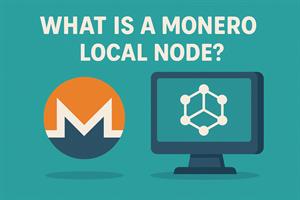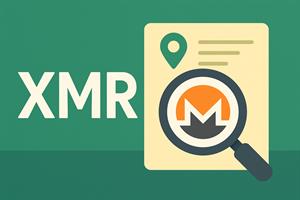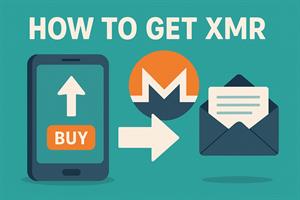A Monero local node is a copy of the Monero network software (monerod) running on your own computer or server. It downloads and verifies the blockchain directly from peers and serves your wallet locally over 127.0.0.1:18081 (the default RPC port).
In plain English: instead of trusting someone else’s server, your wallet talks to your node for balance, sync, and broadcasting transactions.

Local Node vs. Remote Node
- Local node: Runs on your device/home server. You independently verify blocks and transactions, keep mempool data locally, and reduce metadata leaks.
- Remote node: Your wallet connects to someone else’s
monerodon the internet. It’s convenient, but the operator can see your IP and basic wallet sync patterns (timing, height requests) and will relay your transactions on your behalf.
Bottom line: A local node delivers the best mix of privacy, sovereignty, and reliability for everyday Monero use.
What a Local Node Actually Does
- Downloads & verifies the blockchain from peers (trust-minimized).
- Indexes data your wallet needs to scan incoming funds.
- Relays your transactions directly to the network (not through a third party).
- Optionally participates in the network by serving blocks/txs to other peers.
Full vs. Pruned Nodes
- Full node: Stores the complete blockchain history. Best for long-term archival and serving other peers.
- Pruned node: Discards non-essential historical data after validation, keeping only what’s needed to verify the chain. Much smaller storage footprint with the same day-to-day usability for a wallet.
Tip: If you’re new or space-constrained, start with --prune-blockchain.
Resource Requirements (Practical Ranges)
- Disk: SSD strongly recommended. Pruned: tens of GB; Full: hundreds of GB (grows over time).
- RAM/CPU: Modest. Any modern desktop or small server works.
- Bandwidth: Initial sync is the heaviest (can be tens of GB). After that, daily usage is modest.
How to Run a Local Monero Node (Quick Start)
- Install official software: Get the Monero GUI/CLI from the official Monero website. Verify signatures if you can.
- Start the daemon:
# Windows monerod.exe --prune-blockchain
macOS / Linux
./monerod --prune-blockchain
Useful options:
--data-dir # store blockchain on a specific drive --out-peers 64 --in-peers 32 # tune peer counts (optional) --confirm-external-bind # required when binding non-local addresses --restricted-rpc # if you must expose RPC (better: don't; use Tor/VPN)
- Let it sync: Keep the window open; first sync can take hours (or more) depending on hardware/network.
- Connect your wallet:
- Monero GUI / CLI: Set daemon to
127.0.0.1:18081(default RPC port). - Mobile wallets (same LAN): Use your node’s LAN IP and
18081. Do not expose RPC to the internet; use Tor hidden services or a private VPN (Tailscale/ZeroTier) if you need remote access.
Privacy & Security Best Practices
- Don’t expose RPC publicly. If you need remote access, prefer Tor or a private VPN. Avoid port-forwarding
18081to the open internet. - Use a pruned node on an SSD for fast, reliable sync.
- Back up wallet seeds (not the whole chain). Your node can be rebuilt; your seed cannot.
- Keep software updated to the latest stable release.
Common Ports (Mainnet)
- P2P:
18080(node↔node) - RPC:
18081(wallet↔node) - ZeroMQ:
18082(advanced integrations)
Troubleshooting
- Sync is slow: Use an SSD, allow more peers (
--out-peers 64), and avoid aggressive firewalls during initial sync. - Wallet won’t connect: Ensure
monerodis running, RPC is on127.0.0.1:18081, and your wallet is pointing to that address. - Low disk space: Switch to pruning (
--prune-blockchain) or move--data-dirto a larger drive.
FAQ
Do I need to run a node 24/7?
No. Your wallet can still work with your local node whenever it’s on. Continuous uptime helps the network, but it’s optional for personal use.
Is a pruned node less private?
No. Pruning affects storage, not the verification model or wallet privacy.
Can I use a local node with mobile wallets?
Yes. Point the app to your node over your LAN or via Tor/VPN. Avoid exposing RPC directly to the internet.
Why not just use a remote node?
Remote nodes are convenient, but you give up some privacy (IP and usage metadata) and must trust someone else’s server. A local node returns control to you.
Takeaway: A Monero local node is the best way to use XMR privately and sovereignly. Start pruned on an SSD, point your wallet at 127.0.0.1:18081, and you’ll enjoy trust-minimized verification, reliable mempool access, and fewer metadata leaks—every time you spend or receive Monero.

